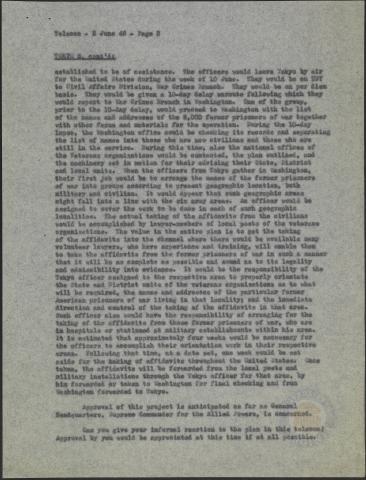
Page 3
| Parent | Teletype Conference June 5, 1946 |
|---|---|
| Date | 5 June 1946 |
| Language | English |
| Collection | Tavenner Papers & IMTFE Official Records |
| Box | Box 3 |
| Folder | General Reports and Memoranda from June 1946 |
| Repository | University of Virginia Law Library |
Telecon – 5 June 46 – Page 3
TOKYO 5, cont’d:
Established to be of assistance. The officers would leave Tokyo by air for the United States during the week of 10 June. They would be on TDY to Civil Affairs Division, War Crimes Branch. They would be on per diem basis. They would be given a 10-day delay enroute following which they would report to War Crimes Branch in Washington. One of the group, prior to the 10-day delay, would proceed to Washington with the list of the names and addresses of the 8,000 former prisoners of war together with other forms and materials for the operation. During the 10-day lapse, the Washington office could be checking its records and separating the list of names into those who are now civilians and those who are still in the service. During this time, also the national offices of the Veterans organizations would be contacted, the plan outlined, and the machinery set in motion for their advising their State, District and local unites. When the officers from Tokyo gather in Washington, their first job would be to arrange the names of the former prisoners of war into groups according to present geographic location, both military and civilian. It would appear that such geographic areas might fall into a line with the six aray areas. An officer would be assigned to cover the work to be done in each of such geographic localities. The actual taking of the affidavits from the civilians would be accomplished by lawyer-members of local posts of the veterans organizations. The value in the entire plan is to get the taking of the affidavits into the channel where there would be available many volunteer lawyers, who have experience and training, will enable them to take the affidavits from the former prisoners of war in such a manner that it will be as complete as possible and sound as to its legality and admissibility into evidence. It would be the responsibility of the Tokyo officer assigned to the respective area to properly orientate the State and District units of the veterans organizations as to what will be required, the names and addresses of the particular former American prisoners of war living in that locality; and the immediate direction and control of the taking of the affidavits in that area. Such officer also would have the responsibility of arranging for the taking of the affidavits from those former prisoners of war, who are in hospitals or stationed at military establishments within his area. It is estimated that approximately four weeks would be necessary for the officers to accomplish their orientation work in their respective areas. Following that time, at a date set, one week would be set aside for the taking of affidavits throughout the United States. Once taken, the affidavits will be forwarded from the local posts and military installations through the Tokyo officer for that area, by him forwarded or taken to Washington for final checking and from Washington forwarded to Tokyo.
Approval of this project is anticipated as far as General Headquarters, Supreme Commander for the Allied Powers, is concerned.
Can you give your informal reaction to the plan in this telecom? Approval by you would be appreciated at this time if at all possible.
